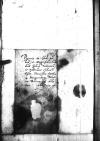Letter #3003
Andrzej ZEBRZYDOWSKI to Ioannes DANTISCUS, Tiedemann GIESE & Stanisław KOSTKASubkowy, 1546-10-21
| received Heilsberg (Lidzbark Warmiński), [1546], end of October Manuscript sources:
Auxiliary sources:
Prints:
| ||||||||||||||
Text & apparatus & commentary Plain text Text & commentary Text & apparatus
Reverendissimis in Christo Patribus et Magnifico Domino, dominis
ms 1 [...] paper damaged⌈cisms 2 cis,
ms 1 [...] paper damaged⌉ carissimis et ms 2 honoran(dis),
ms 1 [...] paper damaged⌈honoran(dis) or honoran(dissimis)⌈honoran(dis)honoran(dis) or honoran(dissimis)⌉ms 2 honoran(dis),
ms 1 [...] paper damaged⌉
Reverendissimi in Christo Patres et Magnifice Domini, domini amici in Domino carissimi ac honoran(di) or honoran(dissimi)⌈honoran(di)honoran(di) or honoran(dissimi)⌉.
Salutem et mutuam benevolentiam.
Quid egerim et qua ratione sim usus in hac apud
Pastorem me Dominus constituit concrediditque ovile suum, quemadmodum et Reverendissimis Dominationibus Vestris, in quo ita quemlibet nostrum iussit esse sollicitum, ut suo quisque non alieno gregi prospiciat, et eius tantummodo curam gerat, cuius rationem est redditurus. Itaque cum repperissem, in hac ovilis mei parte religionem ita collapsam, ut sine lacrimis narrari non possit, officio meo ep(iscopal)i or ep(iscop)i⌈ep(iscopal)iep(iscopal)i or ep(iscop)i⌉ sum functus, religionem iam collapsam erigere sum aggressus. Accessit ad officium hoc serenissimi
ms 1 [...] paper damaged⌈itterisms 2 itteris,
ms 1 [...] paper damaged⌉ apertis atque patentibus, quo serio episcopis Vladislaviensibus iniungitur, ut his monasteriis recte et tempori prospiciant, ne in aliquid mali eorum negligentia relabantur. Quod quidem mandatum est etiamnum apostolica auctoritate confirmatum.
His ego rebus fretus, ita egi in monasteriis: Procuratores quosdam pri BCz, 247, p. 416mum, qui nescio, cuius erant iurisdictione constituti, officio movi. Compereram enim, hinc possessiones monasteriorum esse distractas, argenti vim non parvam ex templis elatam, in monasterium debita maxima invecta. In quorum loca ex meis quosdam sublegi ecclesiisque illis servire iussi, neque ipse, ut ad Dominationes Vestras est allatum, occupavi, sed ne quisquam deinceps occupet, viam praeclusi, neque spoliatorem, ut isti asserunt, egi, sed ita cavi, ne quis sit, qui spoliare possit. Deinde, quia vidi ob personarum regularium defectum cultum divinum non potuisse exacte persolvi, addidi meos sacerdotes, qui illos in habendis contionibus et sacramentis ministrandis iuvent, quae duo illic prorsus cum magno totius populi dolore intermissa fuerunt. Qui(nimo) enim fieri potuit, ut tres fratres (tres enim ego, non decem
BCz, 247, p. 416mum, qui nescio, cuius erant iurisdictione constituti, officio movi. Compereram enim, hinc possessiones monasteriorum esse distractas, argenti vim non parvam ex templis elatam, in monasterium debita maxima invecta. In quorum loca ex meis quosdam sublegi ecclesiisque illis servire iussi, neque ipse, ut ad Dominationes Vestras est allatum, occupavi, sed ne quisquam deinceps occupet, viam praeclusi, neque spoliatorem, ut isti asserunt, egi, sed ita cavi, ne quis sit, qui spoliare possit. Deinde, quia vidi ob personarum regularium defectum cultum divinum non potuisse exacte persolvi, addidi meos sacerdotes, qui illos in habendis contionibus et sacramentis ministrandis iuvent, quae duo illic prorsus cum magno totius populi dolore intermissa fuerunt. Qui(nimo) enim fieri potuit, ut tres fratres (tres enim ego, non decem
ms 1 [...] hidden by binding⌈mms 2 m,
ms 1 [...] hidden by binding⌉ magnims 2 s con,
ms 1 [...] paper damaged⌈s conms 2 s con,
ms 1 [...] paper damaged⌉sumpsi, meis etiam nunc eos impensis sustineams 2 m,
ms 1 [...] hidden by binding⌈mms 2 m,
ms 1 [...] hidden by binding⌉. Hic sms 2 i alicu,
ms 1 [...] paper damaged⌈i alicums 2 i alicu,
ms 1 [...] paper damaged⌉i iniurius sum visus, poterit me loco et tempore suo conms 2 veni,
ms 1 [...] paper damaged⌈venims 2 veni,
ms 1 [...] paper damaged⌉re. Dominationes Vestrae nihil me hic officio meo egressms 2 um,
ms 1 [...] hidden by binding⌈umms 2 um,
ms 1 [...] hidden by binding⌉ fuisse credant.
Quarum me amori diligenter commendo.
Dat(ae)
hidden by binding⌈[t(ae) hidden by binding, possibly t(um)⌈taet(ae) hidden by binding, possibly t(um)⌉
]t(ae)
hidden by binding⌉ ex


